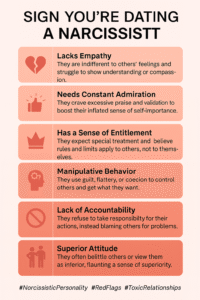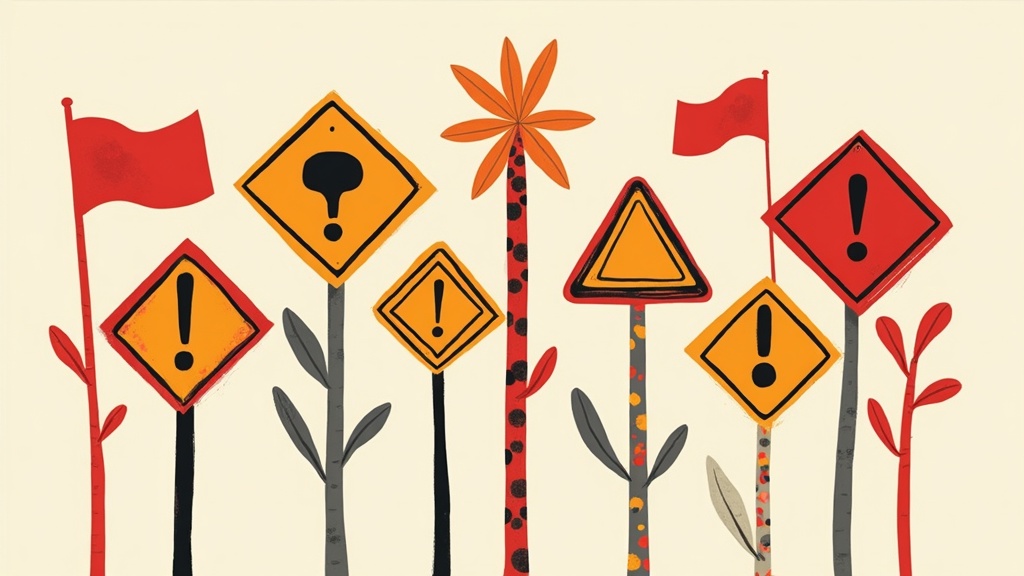If your new relationship feels perfect on the surface but leaves you anxious, confused, or emotionally drained, you may be dealing with more than typical relationship ups and downs. Narcissistic relationships often start with charm, attention, and intensity—making it easy to overlook early warning signs. Over time, though, that excitement can give way to manipulation, control, and emotional exhaustion. Through my own experiences and research, I’ve recognized how subtly these patterns can emerge and how damaging they can become if left unchecked. That’s why I’ve gathered key signs to help you spot the red flags early, understand the dynamics of narcissistic behavior, and protect your emotional well-being before things spiral further.
What Narcissism Looks Like in a Relationship
Dating a narcissist is confusing, to say the least. Narcissists bring a strong sense of self-importance, a craving for admiration, and a pretty apparent lack of empathy for others. These personality traits aren’t just annoying habits; they can seriously damage self-esteem and emotional well-being over time.
Narcissism, as psychologists describe it, is a pattern that can show up in anyone, though not everyone with confident qualities is a full-blown narcissist. When someone has narcissistic traits, their need to be right, admired, and in control leaves very little room for healthy give and take in a partnership. Where a healthy relationship is built on equality, mutual respect, and kindness, dating a narcissist usually means walking on eggshells, trying to avoid their temper, or constantly questioning your own worth.
Awareness of these signs can help you spot them early, possibly saving yourself years of confusion or heartache. Let’s walk through the alarm bells you should watch out for.
Significant Warning Signs of Dating a Narcissist
Not every selfish or difficult person is a narcissist. Still, when several of the following signs show up together over time, it’s a strong indication you’re not just dealing with typical quirks. Here are the big ones that stand out, based on my own observations and the research I’ve checked out:
- They Make Everything About Themselves: In conversation, they redirect any story or experience back to themselves, downplaying your feelings or successes. If you come to them with your news, they’ll often find a way to upstage you.
- Lack of Genuine Empathy: Your partner struggles to recognize or care about your emotions, especially during tough times. They might seem cold, dismissive, or even bored if you’re upset.
- Love Bombing and Sudden Withdrawal: At first, they’re over the top romantic, texting constantly and showering you with attention. Then, without explanation, that affection disappears, leaving you wondering what you did wrong.
- Manipulative Behavior: Gaslighting is commonly used; they deny saying hurtful things, twist your words, or make you question your memory and feelings. You might end up apologizing for problems you didn’t cause.
- A Strong Need for Control: Decision-making revolves around their needs or preferences. Even small choices, like where to eat or what movie to watch, are dictated or criticized by them.
Early-Stage Clues: When It Feels Too Perfect
The early days of dating a narcissist often feel intense and almost magical. I’ve seen how people get swept off their feet by the charm and energy narcissists display in the beginning. This stage is sometimes called the “honeymoon phase.” While it feels incredible, it’s designed to hook you in.
- Constant Praise: Narcissists often dish out compliments, talk about soulmates, or make huge promises early on.
- Moving Quickly: You might notice talk of moving in together or meeting family comes up unusually soon.
- Minimal Focus on You: Eventually, conversations change, and their needs or ideas occupy all the space. Your feelings quickly become secondary.
If these patterns ring true, it’s a good idea to pause and ask yourself whether the connection feels mutual, comfortable, rushed, or overwhelming.
How Narcissists Keep You Off Balance
One thing that stands out in most stories from people who’ve dated narcissists is how unpredictable the relationship feels. That’s because narcissists often use specific tactics to stay in control and keep you on your toes.
- Hot and Cold Behavior: Days of affection and attention are followed by coldness or even silent treatment, leaving you desperate to “win them back.”
- Jealousy and Possessiveness: They may seem jealous about your friends or activities, but not in a caring way; it’s about controlling your time and attention.
- Criticism Disguised as Concern: Jabs about how you dress, your laugh, or your friends are spun as “just being honest.” Over time, this chips away at your confidence.
This behavior leads to constant second-guessing, which is emotionally exhausting and keeps one distracted from one’s needs and happiness.
Common Emotional Side Effects of Dating a Narcissist
Even if you don’t spot narcissistic behavior right away, the effects on your well-being can be noticeable. Over time, you might notice:
- Doubting Yourself More Often: You find it harder to trust your feelings or decisions.
- Feeling Isolated: You might lose touch with friends or family because your partner pressures you or you’re too drained.
- Walking on Eggshells: You avoid specific topics or hide your honest thoughts to keep the peace.
Recognizing these feelings is really important. They don’t just happen overnight, and they’re not your fault; they’re a direct result of the controlling, manipulative environment that narcissists often create.
Extra Context: Why Narcissists Act This Way
Understanding the roots of narcissistic behavior can help put some patterns in perspective. While I’m not a psychologist, what I’ve read and heard from experts points to a few common causes:
- Low Self-Esteem: Surprisingly, a lot of narcissists have deep insecurity, so they overcompensate with arrogance and manipulation.
- Lack of Emotional Maturity: Growing up without healthy emotional support sometimes leaves them unable to relate to others in a caring way.
- Learned Patterns: Some behaviors get reinforced if they’ve always gotten their way or avoided consequences for hurtful actions.
This doesn’t mean narcissists can’t change. However, in most relationships, they’re unlikely to seek help unless they see a benefit for themselves.
What To Do If You See These Signs
If some or all of these warning signs show up in your relationship, there’s no quick fix, but there are practical steps you can take to protect your well-being:
- Talk with Someone You Trust: If you’re feeling lost or confused, friends, family, or a trained professional can help put things in perspective.
- Set Clear Boundaries: Start small. Say no, ask for space, and notice how your partner reacts. Healthy relationships respect boundaries, while narcissists often push right past them.
- Reconnect with Your Interests and Friends: Don’t give up hobbies or people you love. Staying connected to your own life boosts confidence and makes it easier to make tough decisions.
- Seek Help if Needed: If the situation turns emotionally abusive or you find leaving hard, reaching out to a therapist or support group can really make a difference.
Recognizing and leaving a relationship like this isn’t easy or quick, but you deserve to feel respected and safe. Checking out resources like Psychology Today’s guide to narcissism or the National Domestic Violence Hotline can help with the next steps.
Narcissist Partners: Common Questions
These are a few of the questions I get asked most often about dating someone who might be a narcissist:
Question: Can a narcissist love someone?
Answer: While narcissists may feel infatuation or desire, their idea of love is often tied to what you can do for them. Genuine empathy and long-lasting care are usually missing.
Question: Why is it so hard to leave a narcissist?
Answer: Narcissists often create intense highs and lows in a relationship, which can feel addictive. The need for approval keeps some people stuck, and isolating yourself from your support system can make leaving even tougher.
Question: Do narcissists ever change?
Answer: Real change is rare and usually only happens if the person genuinely wants it. Therapy helps, but it’s not a quick fix. You don’t owe it to anyone to stick around and wait for them to improve.
Key Takeaways for Your Relationship Health
Spotting the signs of narcissism early makes a huge difference in protecting your emotional health. Trust your gut, lean on people you trust, and remember—you can decide what you want from a relationship.
Paying attention to small patterns, practicing self-respect, and seeking help when needed go a long way toward building happier, healthier connections. Every relationship teaches you something about yourself, and sometimes, recognizing a narcissist is the first big step to finding real, lasting happiness.
A Few Extra Self-Care Tips:
- Journaling: Keeping a daily journal of your feelings and experiences can help you watch for changes in your self-esteem or stress levels and give you a place to track patterns in your relationship.
- Regular Check-Ins: Talk to friends or a therapist about your feelings. An outside perspective can sometimes help you spot things you might be too close to see.
- Set Personal Goals: Focus on things that make you feel strong and independent—career achievements, hobbies, or fitness. This will put you back in control of your sense of worth.
The road to a healthier relationship starts with being kind to yourself and knowing when to ask for help. If you spot red flags, remember that your happiness and peace of mind come first. You have the strength and support to move forward, no matter how tough it seems.
Video: The Shocking Truth About Dating a Narcissist

